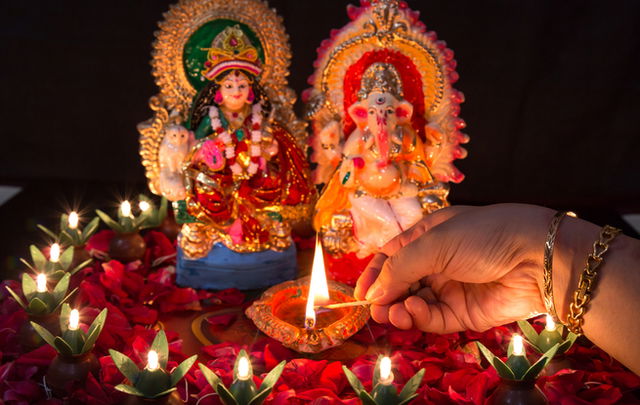- Calendar
- Calendar 2025
- October
- Dhanteras
Dhanteras
Dhanteras is a Hindu celebration where people buy gold and utensils as it is believed to bring good luck, health, and prosperity and ward off evil. It is celebrated on the 13th day after the full moon in the month of Ashvin or two days before Diwali. In 2023, it will be celebrated on October 29.
This year, Dhanteras will be observed with the Trayodashi Tithi starting at 12:01 AM on October 29 and ending at 2:45 AM on October 30, while the auspicious time for Dhanteras Puja is from 7:27 PM to 9:16 PM on October 29, coinciding with the Pradosh Kaal from 6:37 PM to 9:16 PM.
Dhanteras, also known as Dhanatrayodashi and Dhanwantari Triodasi is derived from two words- ' Dhan ' (meaning wealth) and 'Teras' (meaning the 13th day). It is not a public holiday in India.

On this day, people clean their homes and light a Diya or lamp for the God of Death, Yamaraj. By doing so, you can prevent any accidents or mishaps which might have led to an untimely or unfortunate death.
The Story Behind Dhanteras
There are many legends or Hindu mythological stories that have been linked with the Dhanteras celebration.
The Tale of Samudra Manthan
Dhanteras is the day when people worship Lord Dhanvantari or the God of Ayurveda. It is said when the Gods and Asuras were striving to obtain the nectar of immortality or Amrit from the ocean (also known as Samudra Manthan or churning of the milk ocean in the Hindu mythology), Lord Dhanvantari appeared.
He was holding a Kalash or pot filled with Amrit or nectar and a holy book about Ayurvedic medicines. Thus, worshiping the God of Ayurveda is wholeheartedly performed to ensure the well-being of people. Jaggery and coriander are some of the offerings made to the God.
Due to this reason, National Ayurveda Day is also being celebrated on November 10 this year.
The Legend of the Devoted Wife and Lord Yamaraj
Another Hindu legend tells the story of a wife who was successful in saving her husband from the hands of death. The youngest son of King Hima was prophesied to die on the fourth night after his marriage.
However, his beautiful and devoted wife was determined to not let this happen. In order to save her husband, she lit hundreds of Diyas all over the house and placed all her golden and silver jewelry as well as all the money in the house near the doorstep.
She did not let her husband fall asleep and instead made him stay awake the entire night by narrating old mythological stories and Puranas and also singing devotional songs.
When Lord Yamaraj, the God of Death, arrived in the form of a snake to take the young man's life as was fated, he got distracted by the enormous heap of gold and silver accumulated at the doorstep. The Diyas also blocked his vision as it was shining very brightly.
Thus, he ended up forgetting about the fated hour of the death as he was busy listening intently to her devotional songs and the young prince's life was spared.
Another significant Hindu Mythological tale associated with Dhanteras is the story of Lord Shiva and Goddess Parvati. It is said that on this day Goddess Parvati played dice with her husband Lord Shiva and won. This is significant for businessmen and traders today because it is said to bring good fortune.
Significance of Dhanteras
Dhanteras is considered an auspicious or fruitful time to invest in new things and start new ventures such as the stock market, real estate, and so on. People buy gold, silver, coins and so on which symbolize fortune and good luck.
Many also perform Puja on this day to seek the blessings of god and to eliminate any negative or evil energy that might hinder their success.
Celebrating Dhanteras: Traditions And Customs
- People pray to many Hindu gods and goddesses on this day such as Lord Dhanvantari, Goddess Lakshmi, Ganesha and Kubera, the God of Wealth.

- Houses are thoroughly cleaned and entrances are decorated with lights, rangoli, and colorful lanterns to welcome the gods and goddesses.
- People flock to the markets to buy gold, silver, new household appliances, and so on because these metal purchases are believed to bring good luck.

- Footprints are drawn near doorsteps that symbolize the entry of Goddess Lakshmi.

- Similar to the Diwali celebration, children and adults burst firecrackers to celebrate Dhanteras.
You might like to read these articles next:

Other Celebrations
-
Aug 27 Wed
-
Oct 21 TueDiwali Holiday
-
Oct 22 Wed
-
Oct 22 Wed

Dhanteras - Next years
Saturday, 07 November 2026
Thursday, 28 October 2027
Monday, 16 October 2028














